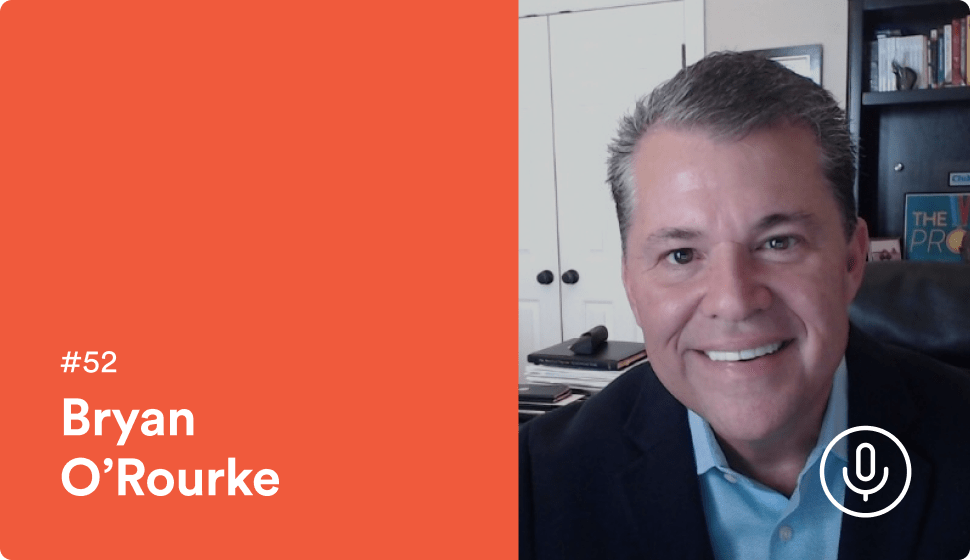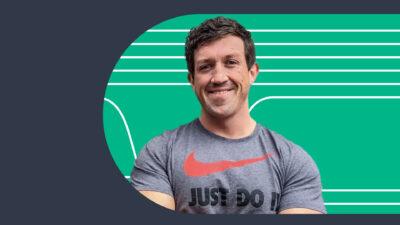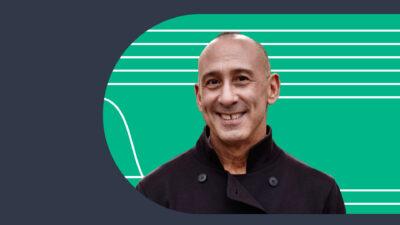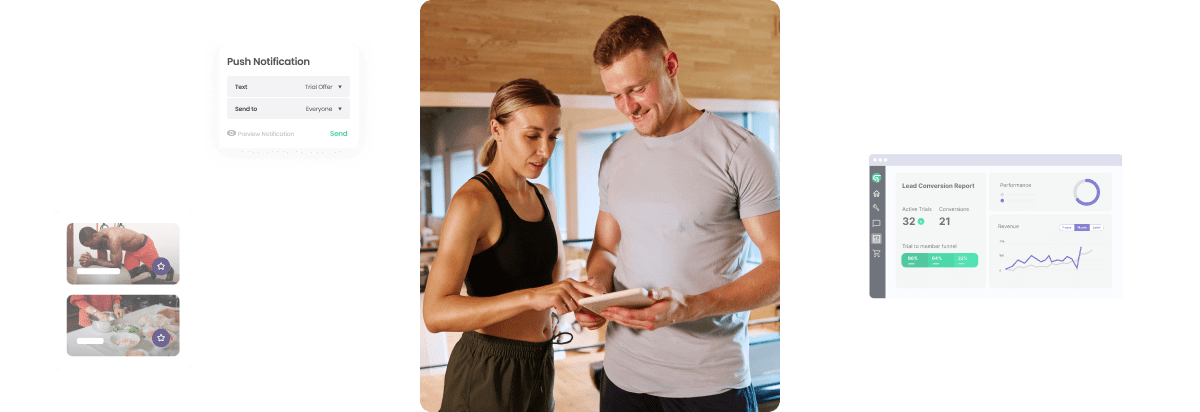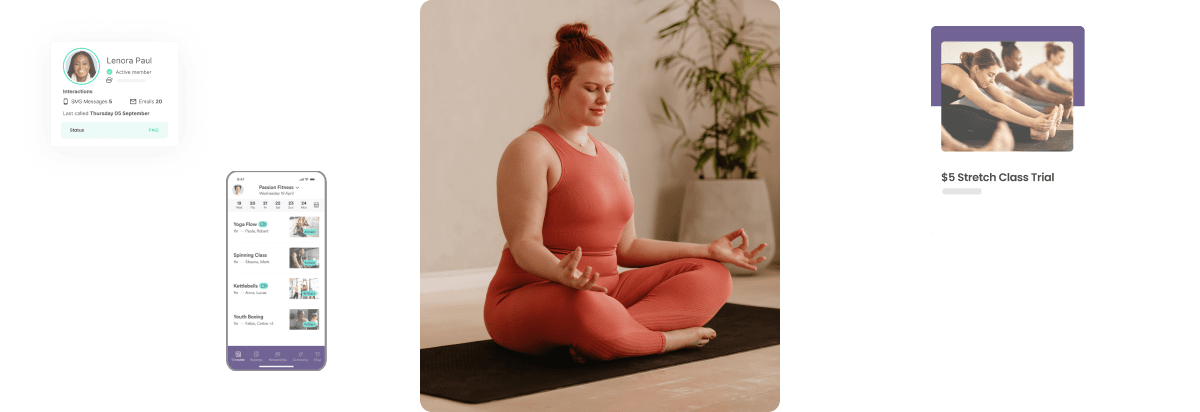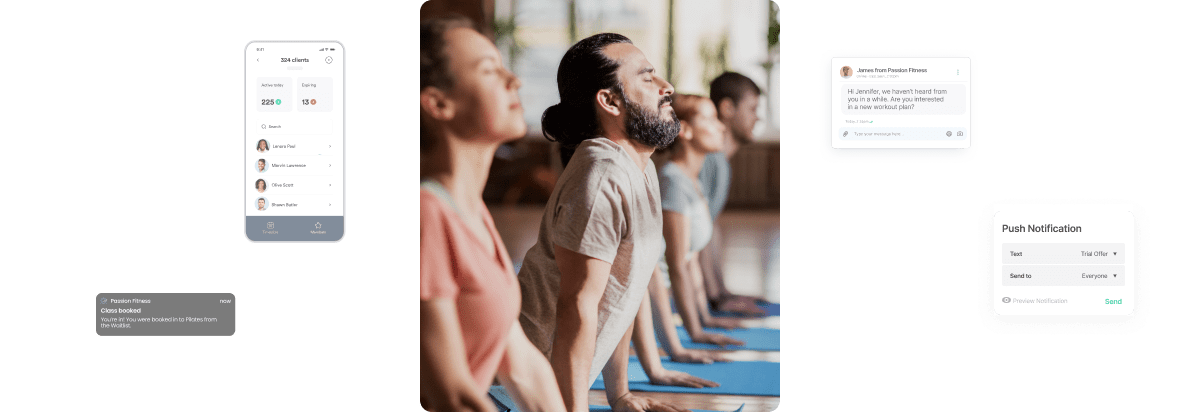This week we talk to Bryan O’Rourke, the President of the Fitness Industry Technology Council who holds a range of different leadership, speaking, and advisory roles across the fitness industry.
You can find Bryan here.
In this episode, Bryan talks about how the growing influence of technology in fitness over the past few years, how major tech companies are moving into the fitness and health space, and what large franchises and independent operators need to do as the market becomes more competitive.
Episode Link
This episode of The Fitness Founders Podcast can be found on Spotify, Apple Podcasts, and anywhere you get your podcasts.
Transcript
Kevin: How is it going everyone? Welcome to the Fitness Founders Podcast. I’m Kevin Mannion, VP Marketing here Glofox. This week we talk to an industry veteran, Bryan O’Rourke, President of the Fitness Industry Technology Council and holder of a range of leadership, speaking, and advisory roles across the fitness industry.
In this episode, Bryan talks about the growing influence of technology in fitness, how major tech companies are moving into the fitness and health space, and what large franchises and independent operators need to do to be competitive. Let’s have a listen.
Hey, Bryan O’Rourke, welcome to the show.
Bryan: Kevin, thank you so much for inviting me to get on here. I hope things are going as well as they can there in Ireland. I know you have some challenges there as well as us in the United States but it is good to see you.
Kevin: Yeah you too, you too. Yeah, we’ve all got our challenges but I think we’re surviving. Looking forward to next year. Hopefully, it’s going to be better. I think to kick off, it’s great to have somebody of your experience and expertise on the podcast today, and maybe we kick off, tell us a little bit about yourself rattle through that long resume that you have there.
Bryan: Google me and look on the show notes or connect with me on LinkedIn. I was in the Food & Beverages business, have a background in Finance, and did a number of things in that arena, and then went to work for a company which I had a stake in and equity… called Smoothie King Franchises which is now a global brand. Eventually did a bunch of other activity and got into the fitness space in 2006-2007, actually 1997. I get my numbers mixed up.
I’ve been in this space for about 33 years and then we’ve had a number of companies – health clubs, I own a chain now, been working in the technology space and arena in that front for a long time. We even distributed; we’re one of the largest distributors of Les Mills group fitness in United States for a decade. I’ve been writing books, speaking around the world on the subject of consumer trends, technology, etc. for over a decade.
Kevin: Awesome. Now, before we dig into the main topics today, just curious like seeing as you have a number of clubs that you own and various investments. What type of businesses do you think are going to bounce back faster versus ones that are going to struggle into next year?
Bryan: Yeah, that’s a big question, right. Obviously, there are certain huge businesses that have done well, like if you’re on the toilet paper business or if you’re selling Clorox, it did very well. Home fitness equipment has done very well. One of our companies is Vertimax, which is a sports performance company that sells equipment and we done great business this year, thankfully. Of course, other ones have suffered. God bless them. It’s been a tough road for a lot of facilities, fitness facilities, because of governmental shutdowns as you all know in Ireland and as we dealt with here in the States. There’s been challenges and opportunities of going forward obviously as we touch upon, Kevin, the digital component of everything has become more relevant than it has ever been, right?
Kevin: Yes. Yeah, big time and looking forward to talking about that.
Bryan: Yeah.
Kevin: Okay. Let’s kick off then I think whether you predict the future a little bit, I think towards the start of the year and wrote an article about the rise of online and digital fitness, so maybe let’s cast your mind back there and tell us you know why did you think that digital was going to take over the way it did or before all this coronavirus started.
Bryan: Yeah. Well, I’ve been talking about that subject for about a decade, so I’ve been invested in it. All you have to do is look around at other industries to see what has occurred and it’s a combination of consumer convenience and the ubiquity of the internet of course combined with mobile devices proliferating in 2000 what 6, 7? iPhone came out. The new era of smartphone and so we’ve seen the rise of devices always on connectivity and then consumers becoming very accustomed to seamless experiences on services and products.
Looking at industries such as financial services, just one example. There are not many people that have been going to banks physically for a number of years, and then you see the matriculation of platforms like Amazon in the States and in other parts of the world with household adaption of Amazon Prime exceeding the number of households with Christmas trees for Christmas, or even the number of people that actually vote.
The point being that technology has been proliferating for a while. It’s been part of the consumer ethos for years and years and it’s really up to business models to figure out how do they meet their customer, where do they want to be meet. We saw those seeds been planted for a long time, so when something unfortunate like the pandemic hits, what happens is that it just accelerates all those variables that were already underway and really seeded it. It just accelerates it all. Necessity is the mother of invention as they say, right?
Kevin: Yes, indeed. How do you think specifically customer expectations have changed in the past year, or what’s your thought on how they evolved?
Bryan: Yeah, there’s many dynamics about that. Again, back to the seeding dynamic with respect to customer expectation. One of the things that I think is an underpinning that has have some many implications Kevin. I random expectations is something you may not anticipate me bringing up, but it’s something called trust. The Edelman Barometer is a global survey around the world that measures the level of trust that people have in general in our institutions. It is at a historic low globally, so people are quite cynical and they have been for a long time. One of the adverse consequences of technology and the lack of regulation in many respects over the big tech has been what algorithms have done to serve us and also to disservice us. Because now the algorithms are offering up information to gain our attention and that sometimes isn’t good.
Before I make comments about more a less serious items. I think that something that people should really pay attention to and I had talk to the European Union and some of the work has been going on with respect to privacy and other things that are kind of the consequence of the ubiquity of technology in general. But putting that aside because it’s kind of a down issue as well as mental health and people’s being overly occupied with Facebook likes. The other good side is that is convenience, it’s hyper personalization, it’s giving people what they want, it’s the ability to anticipate needs, they validate to service what people are looking for faster and then customers are happy because they get what they want when they want it. And when you look at net promoter score globally, the brands that score the highest are the ones that are largely automating their customer interface, self-service. In the United States, Amazon is one of the highest net promoter score brands. Apple, is one of the highest net promoter score brands in the world. But when you purchase a new apple watch, you’ve never really talk to anybody unless you go to a store.
That dichotomy is a great opportunity and a challenge for fitness operators because technology will replace a lot of the, through automations etc., a lot of functionality to enable reaching the customer better and more conveniently. But that will not replace empathy. It will not replace human caring. It will not replace those kinds of dynamics that machines can’t perform. The real sweet spot for brands today and you can see this on Apple in what they do is really depth immigration of robot systems that automate a lot of this stuff to make customer happy align with really caring people that want to help people and service them when they need to talk to an individual or to experience something. So, whether it is going to a restaurant, or having a great fitness experience, when you do that and you have that human interaction, you want to really have it be outstanding and not mediocre. I think we see this kind of dynamics playing out across all consumer industries for the most part.
Kevin: Yeah. Says to me about our trust in the institution is going down but our satisfaction with the major tech corporations is going up.
Bryan: Yeah. It tricked us a little bit, but we’re riding the ship.
Kevin: I hear you. Probably one of the biggest changes that’s going to have a long-term impact on the fitness industry is the companies like Apple and Google entering into the fitness and health industry. What advantages do those types of companies have over others when they enter the market?
Bryan: Yeah, well they have something you’ve mentioned in your notes, almost zero marginal cost. They can scale without a lot of expense. The other thing they have is the benefit of network effects. If you have an ecosystem like an Apple or Google, this is plug & play for them because they are already have a huge user base. And so, this gives them great strategic advantage because they have captive audiences. Part of why I mentioned before it’s a problem because it’s… many cases. When you look at Google, they really are non-regular monopoly, they control almost 90% of global service. That’s really disadvantage when it comes to competition and healthy competition. But what’s going on for these brands, and that include Samsung, little different; it includes Facebook, who adapted Oculus which they acquire a number of years ago and they believe that augmenting in virtual reality is the next great computing platform which I agree with them on. They attempted to acquire Fit Bit which Google is acquiring, subject to any government approvals so they’re all reaching out to make this play.
One of the main reasons for it is that the bit last big bastion of market opportunity for these brands is health. Healthcare and health is the largest heart of our global economy for the most part. And so, the only way these firms are going to be able to maintain their valuations, and I did a recent report on this with respect to Apple alone, is to grab large share of those markets. For example for Apple to reach its value projections in the next 2 to 4 years, it’s going to have to generate another $250 billion a year in revenue. The question is where is it going to get that from? And Tim Cook has been very clear about this last several years, and when people think about Apple the next several years, their design is to be seen as of solution provider for health. When you look at what they’re doing, that’s exactly what they’re doing; and it’s what Google’s going to try to do and everyone else, so. This is a very interesting point in time for a lot of people to see how that kind of represents itself. Even Amazon with its work with Halo recently, their new device. I mean it’s very fascinating.
Kevin: It kind of sounds like fitness is almost the stepping stone for these companies to get into the health business.
Bryan: That’s correct. Its data collection. It’s also the fact that when you have this kind of scale, you shift from transactional relationships to customer lifetime value to eventually life values. If you can get somebody on your ecosystem, giving you data on their activity, etc. overtime in young age, you matriculate them right into all of your health ecosystem down the road, including how they are diagnosed for their entire life. And when you think about the cost of healthcare for an individual over their lifetime, that’s a huge marketplace.
Kevin: Yeah. That’s definitely a very interesting topic, an area. How do you rate these companies, given all the data that they have, how do you rate their ability is going to be to give a personalized fitness experience? If you’re selling subscription for $10 a month, how personalize can a service like that get?
Bryan: Well, it’s going to get very personalize and it’s going to become more personalize. If you look at an app like [unclear] in the United States which got about 50 million users. It’s not a mainstream Apple but it is highly personalize, and you’re going to see the same thing come through all of these other platforms where they are recording everything about you. They know even more than you know about yourself. And then you’re going to get behavioral support, you’re going to get coaching, you’re going to get different modalities of either intervention or behavior modification of that kind of thing. It’s going to be real thing.
Now, does that supplant physical facilities and people going to group fitness or having one on one training? No, it doesn’t. My thesis is what it does is that rising tides lift all boats and I would talk about technology being a gateway drug for the fitness business. Because there are a lot of people, the vast majority of people in the world don’t participate in fitness facility activities. In the United States, it’s 18% or so. Probably the most competitive market is UK. You can look up in the Nordic regions and see maybe in the low 20’s. China though is less than 1% so there’s a large marketplace that has not been touched at all by physical fitness experiences.
I like using the analogy of music. In the days before we dealt with digitalization of music, when Napster rose up and Sony sued them and everyone was fighting over free music and how it was going to destroy the music industry. What it did is it destroyed the music industry that didn’t deserve to be existing anymore because they didn’t add value. In the end, what it did is after the beginning of the 21st century, the number of albums purchase increased by over 300% and the number of live concert performances in the decade that followed increased by 300%. What happens is if I never knew what West African Reggae was because I didn’t have access to 10 million song library, I would have never discover it, and I certainly would have never going out of my way to see a concert to enjoy something that I never would have been expose to in my lifetime. I think the same thing exist with fitness experience and other experiences even experiences of health. People don’t know what they don’t know. So, if there’s a way they can experience something that’s easy, convenient, and helps them on a fitness or health journey, they’re propensity to participate in other things goes way up.
Kevin: Yes. I think this brings to my next question, and before we get to the say independent fitness studio owner and how it affects them. How do you think these changes affect the franchises, the Barry’s Bootcamps and NF45s of the world? Because I think before Apple and Google came along, they were the Apple and Google of the industry. How do you think its going to affect the chains and franchises globally?
Bryan: That’s a big question. It depends on the franchise. Certain franchises are really more sustainable economically than others. There are a number of global budget models that are very solid financial performers. There are other franchises that have not perform that well for a number of reasons, and I’m talking about performance from a standpoint of a unit level economic standpoint. Not, “Oh, we sold a thousand franchises this year and that means were great.” Because there’s a different model between being a franchise or in general, and being a franchisee. But franchising has been a huge part of the growth of the industry. There are some very solid franchises out there and what you see them doing, be it Barry’s and what they’ve done is you see technology incorporated into their offerings. You see their efforts to provide omnichannel experience. You see their efforts to use tech to personalize whether its Barry’s knowing the smoothie you like and they have it prepare for you when you exit the class which is a very unique nice touch; and other things like Alloy personal training franchise out of the US and what they do with their applications and personalize service outside of the studio. Those franchises are out the good ones are adapting technology, just like any concept is today. They are combining that with great in-club or in-fitness facility experience like we talked about earlier. I think it’s a depth integration of great in-facility experience with technology being a fantastic tool to choose right.
Kevin: It’s effectively raised the bar for these franchises. They still need their in-location experience but they have to have the online experience as well to compliment what’s happening in the studio.
Bryan: Yeah, and Kevin I think there will be different types so, I think they’ll some concepts that say, the hell with technology, don’t bring a smartphone in there. We’re just pumping iron and there’s no lights, there’s no air-conditioning, and you’re in there sweating your ass off kind of like ala cross fit, other cross fit uses technology. And I think there’ll be others that be fully automated solution that human involve. I think there’ll be a lot of combinations in between. I think the sweet spot though to try to not become commoditize is that depth blend of great personal experience with great technology.
Kevin: Yeah. That makes a lot of sense. We go all the way down or depending on where you are to the independent fitness studio or club owner on the street, the whole fitness industry just got a lot more complicated for these types of entrepreneurs. How should they start to think about their business and how do they survive and grow with all these other stuff that’s happening?
Bryan: Well, first hearts go out to those that have been going through the troubles ahead as an independent operator. I hope to give you some encouragement. It’s difficult this times have been depending on where you are in the world. But let’s look at the upside. The reality is that the largest gym in the world is on Instagram today. The reality is that there are a lot of people that are very prepared to spend money on virtual experiences with great instructors and content, and you don’t have to be perfect. I think branding and marketing is still a very, very important dynamic for independence. I think those independent people are some fantastic folks. Many of them are very passionate and caring and very talented people. And so, when you think about that and you put aside the pain of the pandemic in the interim in the long term, there’s never been a better time to be an independent operator because the things that you can today because of the cost of technology being so relatively inexpensive. It’s really a function of your creativity and focus on what it is that is differentiating you in the market. And knowing that, you can execute. You basically in your pocket have a global television network. You basically in your pocket have the ability to create podcast like this one through app like Anchor at literally no cost. You literally have the ability to do unbelievable number of things. Same with … vendors who provide integrated solutions on billing, and other things, and content, etc. that enable that to be done which that’s stuff really didn’t exist not that long ago.
Good news is the pandemic didn’t happen maybe 5 to 7 years ago, because today since those seeds were planted that we referred to before, Kevin, at least we have answers. And there’re a lot of people out there that embrace these tools and did okay. They survived. They made it. They’ll make it through. The experience hopefully will help them be more adept in the year to come because 2021 is going to open back up. We’re going to have a global distribution of vaccinations. I expect fully that after Q2 and the early Q3, we’re going to start seeing a very robust return to normal, and a lot of people with pent up demand. Unfortunately, because facilities around the world have been closed and we’ll lose a number of those permanently for a while. The operators that are prepared and ready have a great chance to really garner a lot of market and really do well with their businesses when this starts warming back up.
Kevin: Yeah, that makes a lot of sense. Now, I know this is a difficult question but as an independent operator, you’ve got a lot of options. You can do more online stuff. You might be considering doing more personal training, or more one to one, or maybe you’re talking about doing more outdoor classes. How do you decide whether to focus on what you are already good at or while you experiment with these new things that you could potentially do?
Bryan: That’s a very deep question. It comes down to strategy and making choices. I mean, each situation is going to be different, and each individual being an entrepreneur is going to have a different set of risk tolerance along with certain skillsets as far as what they can reasonably manage to try to do. I think that the first thing fundamentally when advising clients whether they’d be global fitness brand, which I’ve done for years, or even a single operator. You have to make some fundamental decisions about what you can be good at and what is the market that is available, and then you design your offering around that. You can experiment for a time doing things and learning about them. But also, you can’t be everything to everybody. Those are choices. Hope is not a strategy and not making those choices is not a strategy. Certainly, every marketplace, every type of concept, every individual, has different variables. I don’t want to be cavalier and try to paint a broad brush on this; and some people have capital limitations, some people they have overhead that’s too high, they’re tied at a facility where they rent structure is unbearable, so there’s many, many, many variables. But trying to simplify it and I know I can’t answer all the aspects of your questions but I think you start with what are you really good at, what is the market that’s truly available to you, and how do you align that offering of with what you’re good at to that marketplace in a way that makes business sense.
Kevin: Yeah. I think that makes a lot of sense. I think I have wanted this the hard questions. But for somebody right now who’s in a situation where they’re reconsidering what they’re going to do next year and trying to decide whether to keep going or to call it at the end of this year. I know this is a difficult question and there is no one size fits all answer but how should people weigh up those types of decisions based on what we can expect to happen next year?
Bryan: Yeah. It’s an assessment process, and again, there’s a lot of variables. I think where you need to start with this having is subjective as possible and evaluation of where you sit today. If you have a friend or a colleague or somebody that you can… where are you financially, where are you on the market – pre and post, what is your bandwidth going forward, what it is your real situation, what is your capability and capacity? And an honest evaluation. It starts there. Then from there, you move to mindset. What is your persona? How risk averse are you? Are you open minded, are you more close minded? How are you dealing with change? Are you adapted that or not… I think that’s the next.
Then comes the business model aspects which I call it M.U.N.E. So you start with assessment and you do the M which is Mindset. Next is User Experience design, and that’s about what program or the services are you offering, how are those delivered, you’re looking at that omni channel thing or pure digital or whatever that is. And then N stands for New Economics, how are you going to make money, how are you going to monetize. There’s many ways to monetize today and that relates to your business model tied in with some user experience. And then finally your Execution Engines. Today, one of the most important execution engines, there’s a couple of them. One is, what is the enterprise platform you’re using and what is it capable of doing? Because that engine is the thing that’s going to be able to help you automate the things that you’re going to need to do to execute on the user experience in a way that is sustainable and repetitive. Creating a bio persona you need delivering the content, you may being able to do that in a seamless way.
And then the other dynamic of really execution engine is human capital. Do you have the talent? Are you capable, what are you capable of from a human perspective? Because we’re just not unending strings of joy and happiness all the time. Certainly people are depth at certain things, other people aren’t. This is why you’ve seen major brands like even Equinox in US, [unclear] in Europe. They have developed their own even talent agencies to try to attract as much create human capital as they possibly can because you can have a great business concept, you can have the right mindset, you can have the right user experience design. But if you don’t have the enterprise systems and the human capital, you’re not going to able to execute.
Kevin: Okay, that makes a lot of sense. There’s probably a few questions in that that people can ask themselves and maybe it boils down to, A, do you have a clear path to making a profitable business, making some money, and B, do you have the people and the systems in place to make that happen.
Bryan: Yep. Again, assessment. It’s hard. I advise brands but you’ve got to find someone you trust to be able to talk through this over a period of time and really look at objective information the best you can. Sometimes it’s really hard to be objective especially if you’re in something. It’s really hard and finding a person or some organization you can trust to help you assess where you are, it’s really important, and that objectivity is very, very important. It’s a little bit ironic because in the last several years I’ve done a lot M&A work, and it represented a number of brands and they sell their businesses, and a few of them being health club operators in the United States. Depending on the market and their situation, it was through the assessment process that those people started to come to real decisions about strategically what should they do. Because if you’re going to be in the game, you’ve got to be all-in, but don’t jump-in the deep end of the pool if you don’t know how to swim.
Kevin: Yeah. That makes a lot of sense. Okay, as we come towards at the end here we’ll maybe finish on a lighter note, Bryan. I love to know over the past 9 months, what’s 1 or 2 things that have pleasantly surprised you that you’ve learned over that period?
Bryan: One of things that most surprises me. They don’t surprise me really. It just more reassuring, is how wonderful so many human beings can be. In our industry space in particular, I’ve helped a lot of people and a lot of people have helped me. I think even though it’s difficult, we should not count that out. I have the fortune of serving on the IHRSA Board of Directors which is the International Health, Racquet, and Sportsclub Association. It’s the global trade association. Alan Leach from Westwood Clubs in Ireland himself sits on the Board with me, and a lot of wonderful people from around the world do. We’ve spent a lot of time just trying to get health clubs through this. I think one of the great things, not necessarily surprising, but reassuring and comforting is how many will there to help. I would encourage everyone listening to don’t be shy to ask for feedback from professionals that you think might not make time. I’ve spent I don’t know how many hundreds of hours on the phone or these types of conference calls in the last 9 or 10 months, 9 months I guess or 8 months, trying to be of service and help for people, just to be a sounding board. And so, I think that’s just wonderful thing. That’s really the biggest thing that’s kind of made an impression on me.
Kevin: And what’s the hardest lesson that you’ve learned the past 8 or 9 months.
Bryan: I don’t want to sound it wrong. I haven’t had a hard lesson. I think because I’m old and I’ve been kicked in the teeth a few times, and we’ve been luckier than most. I’ve been very, very lucky. My team and I, given our businesses, we have always been digital. We’ve been early adaptors for a very long time. I’ve been fortunate to dodge the bullet. I think maybe a hard lesson is to be more mindful about getting outside and walking around, and we work out at home and the back yard. We’re very lucky we have some green space when I stuck in an apartment like many people are. I think some of it being a little bit more disciplined about getting a proper amount of down time when you’re cooped up. That probably was one of the things that I… Probably that would be the hard lesson that I had that kind of remind myself up more than anything. But that’s not that hard, you know.
Kevin: Okay. Well, not too bad. Well listen, Bryan, this have been a great conversation. We’ve done everything from talking about the tech giants of the world to tips for independent studio owners. I really want to say thank you for your time tonight. Before we go, maybe just tell people where they can find you online and how they can get in touch.
Bryan: Yeah, Bryan with the Y, @Bryankorourke. Pretty much every network you’d find. And then on LinkedIn, Bryan K O’Rourke, so please connect with me, follow me. I have a podcast myself, Fitness + Technology Podcast. I put out about every other week with people from around the world on tech which I have pretty good following ones. I love that. And I write a lot of articles. If you Google my name wherever you are, you’ll find out some of my stuff and I’d love to connect with you. Everybody please have a great holiday coming up. Be careful, be safe, and keep your chin up. Things are going to turn soon.
Kevin: Thank you, Bryan. Thank you for those words of wisdom. Hopefully we see you over here sometime soon.
Bryan: Kevin, it’s been a pleasure. I always love going to back to like my homeland. I spent many of time. Believe me, I’ll be there.
Kevin: I look forward to. Thank you.
This podcast is brought to you by Glofox, a boutique fitness management software company. If you want to accelerate growth, work efficiently, and deliver a well-branded boutique customer experience then find us at glofox.com.
